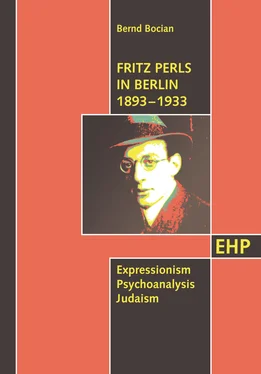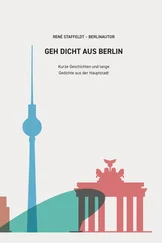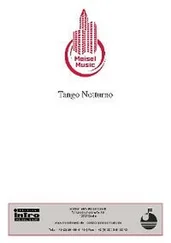Bernd Bocian - Fritz Perls in Berlin 1893 - 1933
Здесь есть возможность читать онлайн «Bernd Bocian - Fritz Perls in Berlin 1893 - 1933» — ознакомительный отрывок электронной книги совершенно бесплатно, а после прочтения отрывка купить полную версию. В некоторых случаях можно слушать аудио, скачать через торрент в формате fb2 и присутствует краткое содержание. Жанр: unrecognised, на английском языке. Описание произведения, (предисловие) а так же отзывы посетителей доступны на портале библиотеки ЛибКат.
- Название:Fritz Perls in Berlin 1893 - 1933
- Автор:
- Жанр:
- Год:неизвестен
- ISBN:нет данных
- Рейтинг книги:3 / 5. Голосов: 1
-
Избранное:Добавить в избранное
- Отзывы:
-
Ваша оценка:
- 60
- 1
- 2
- 3
- 4
- 5
Fritz Perls in Berlin 1893 - 1933: краткое содержание, описание и аннотация
Предлагаем к чтению аннотацию, описание, краткое содержание или предисловие (зависит от того, что написал сам автор книги «Fritz Perls in Berlin 1893 - 1933»). Если вы не нашли необходимую информацию о книге — напишите в комментариях, мы постараемся отыскать её.
Fritz Perls in Berlin 1893 - 1933 — читать онлайн ознакомительный отрывок
Ниже представлен текст книги, разбитый по страницам. Система сохранения места последней прочитанной страницы, позволяет с удобством читать онлайн бесплатно книгу «Fritz Perls in Berlin 1893 - 1933», без необходимости каждый раз заново искать на чём Вы остановились. Поставьте закладку, и сможете в любой момент перейти на страницу, на которой закончили чтение.
Интервал:
Закладка:
Within a very brief span of time, Perls’s lodge encompassed 200, then 300 members. Over the course of the turbulent history of the order, lodges were established in the cities of Berlin, Charlottenburg, Breslau, Stettin, Leipzig, Dresden, Halle, Elberfeld, Düsseldorf, Cologne, Dortmund, Essen, Bremen, Hamburg, and Munich, which can be taken as evidence that Perls’s wine business had expanded across all of Germany.
Perls’s lodges consisted of both Christian and Jewish members, and in Berlin he also established a lodge for women (sisters) which was soon dissolved, however, under pressure from the male lodges. There was a death benefit fund for widows, an assistance fund from which the lodge brothers could receive loans, and two lodges published a journal. The second, called »Freie Bauhütte« (Free Mason’s Lodge) was the official organ of Perls’s »Große Freimaurerloge Kaiser Friedrich zur Duldsamkeit. Großorient Berlin« (Grand Freemason Lodge for Emperor Friedrich and Tolerance. Grand Orient of Berlin) (ibid., 17).
As a rule, problems would emerge in the lodges of Grand Master Perls after some time. On two occasions, the Grand Master was excluded from lodges he himself had founded. One time, a schism arose because a competitor to Nathan had come forward. As early as the end of 1896, a peculiar lodge visit is said to have taken place. The sworn statement of a witness reads:
Years ago, in the lodge he headed, he introduced an elegantly dressed older gentleman who was supposedly a high-ranking dignitary from the English lodge – this under the condition that no one spoke to the man because he understood no German and was still extremely tired from traveling. He feted the dignitary in a lofty speech and then allowed him to remove himself again in silence. As it turned out, the high dignitary was Perls’s father-in-law. Perls was expelled from the lodge. (ibid., 14)
Another event brings to mind the later relationship between Fritz Perls and Paul Goodman. The writer Dr. Hans Spatzier was a member of one of the lodges. »Due to his intellectual superiority and excellent talent as a speaker, he all too soon became a most dangerous rival for ›most worshipful‹ Grand Master Perls« (ibid., 13). Since acceptance at the lodges was swift and uncomplicated, there was apparently a lack of discipline, and differences arose among the members. The majority of the lodge members demitted together with Dr. Spatzier. In a relatively short time, Perls had built up the membership of the grand lodge again by founding new lodges on his business travels. Since Perls was on the road too much for their taste, after some time the new lodge brothers elected Charlottenburg City Councilman R. Issac as Grand Master, naming Perls Provincial Grand Master »in order not to make him overly angry« (ibid., 15). »Nevertheless, the Grand Master was soon forced to expel the Provincial Grand Master on the grounds of un-masonlike conduct. Yet, as the Provincial Grand Master wrote in a press feud in 1903, it was of his own free will that he left the lodge he himself had founded (ibid., 15).
Beginning in 1911, a sisterhood existed in Berlin once again, and according to Eberhardt, one of the peculiarities of life in the Perlsian lodges was that »at lodge celebrations the sisters [are allowed to] participate in temple dedications,« and then »the evening is allowed to end with dancing« (ibid., 18). Based on everything that Eberhard reports, I have formed the impression that Nathan Perls simply did whatever he liked, much like his son later on. For example, there are reports ranging from incredulous to outraged that Nathan »had his brothers dine in Moorish clothing in the presence of guests and that he presented lodge sash and neck jewel to brothers on a Sunday in a profane café over a glass of beer« (ibid., 16). The number of lodge foundings – in some cities there were several – is almost impossible to grasp, as is »the number of curses that Perls … has already heaped upon his own head« (ibid., 18). One of the disappointed brothers wrote, »Each person creates the destiny he deserves; some people absolutely deserve Perls as a worshipful Grand Master!« (ibid., 19).
Eberhard also reports on another side of Nathan Perls and claims that he has been repeatedly informed that:
Perls was a master par excellence at stocking the wine cellars of the lodges, and as a result the brothers had the right drop of wine sparkling in their glasses for every occasion. (…) Perls enjoys seeing himself as the center of attention with everything revolving around him, and if those circumstances allow him to sell some of his wine, then that would naturally be most welcome to him. (…) The lodge brothers are delighted and actually thrust themselves forward when they can buy from their Grand Master. It must be mentioned, however, that to my knowledge Perls did not take advantage of the situation in as much as he always sold qualitatively good wine at reasonable prices. One oc casionally also hears that as a result of his »good-heartedness« Perls raised a number of brothers to the degree of Master in the magical atmosphere and under the egalitarian influence of beer shared in a convivial setting« (ibid., 22).
3.5.2 Grand Master Nathan Perls. Revisionist and Nonconformist
It can also be said of Perls’s father that his lodges were genuinely humanistic, independent of any overarching entities, undogmatic, apparently managed in a freehanded, companionable style rather than a hierarchical authoritarian one, and fluid and adaptable as organizations. It might have been a case of a German Jew creating a microcosm in which he repeatedly attempted to realize the enlightened, humanistic dream of a homeland, a community, an identity that was impartial to religion, race, and gender for himself and some of his brothers or sisters. And apparently it was not dogmatic adherence to the rituals that held these lodge communities together, but rather the members’ social relationships among each other, however well or poorly they may have functioned.
Nathan Perls based his ideological orientation on the principles of the German Union of Grand Lodges. The first three articles of his Independent Order of Freemasons essentially state the following: The organization is a »fraternal, humanitarian association for the cultivation of noble human qualities« (ibid., 12 f.). The ultimate criterion of behavior »is the pure, human moral code,« and »The Freemasons worship God as the highest ideal and the center of spiritual life« (ibid.). In a later announcement, the form of religion is proclaimed to be the personal affair of the respective member; this differed from officially accepted Christian Freemasonry:
The »Große Freimaurerloge Kaiser Friedrich zur Duldsamkeit« is based entirely on a foundation of humanistic principles, and it respects all religious convictions to the extent that they find their natural expression in the recognition of a higher being. Although it does not view the practice of religion as the natural foundation of Freemasonry, it considers religious principles a prerequisite for Masonic activity, while not making the opportunity to participate in the work of the Masonic Confederation dependent on the form of religious practice« (ibid., 16).
Thus, even Nathan Perls was a reformer, a revisionist, who placed human relationships above commitment to dogma. His son, like many a rebel from a good family, sought a new home and identity in other contexts. For both of them, the goal always was the idea of a community that was independent of nationality, race, and religion. Numerous young middle-class rebels sought this home in socialism or, as Fritz Perls did during his middle years, in a mixture of socialism and psychoanalysis. After taking leave of organized Freudian psychoanalysis, Fritz Perls organized his own independent »Gestalt Lodge« in New York together with a small group of founding members. He then traveled widely, and diligently established branches in various cities and locations although without prescribing their development in an authoritarian form or manner. At the very end, Fritz Perls founded his own »independent order of humanists« in the form of a Gestalt kibbutz in Canada with himself as Grand Master. It remains to be mentioned that his German given name, as the first and only son of Nathan Perls, can probably be traced to Crown Prince Friedrich who was revered by Freemasons, was a Freemason himself, and was additionally said to have a liberal attitude toward Jews.
Читать дальшеИнтервал:
Закладка:
Похожие книги на «Fritz Perls in Berlin 1893 - 1933»
Представляем Вашему вниманию похожие книги на «Fritz Perls in Berlin 1893 - 1933» списком для выбора. Мы отобрали схожую по названию и смыслу литературу в надежде предоставить читателям больше вариантов отыскать новые, интересные, ещё непрочитанные произведения.
Обсуждение, отзывы о книге «Fritz Perls in Berlin 1893 - 1933» и просто собственные мнения читателей. Оставьте ваши комментарии, напишите, что Вы думаете о произведении, его смысле или главных героях. Укажите что конкретно понравилось, а что нет, и почему Вы так считаете.











